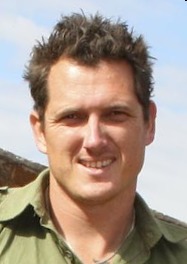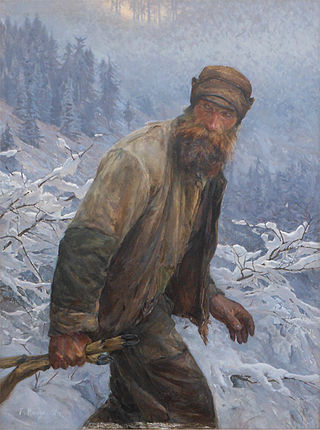
Poaching is the illegal hunting or capturing of wild animals, usually associated with land use rights. Poaching was once performed by impoverished peasants for subsistence purposes and to supplement meager diets. It was set against the hunting privileges of nobility and territorial rulers.

Kruger National Park is a South African National Park and one of the largest game reserves in Africa. It covers an area of 19,623 km2 (7,576 sq mi) in the provinces of Limpopo and Mpumalanga in northeastern South Africa, and extends 360 km (220 mi) from north to south and 65 km (40 mi) from east to west. The administrative headquarters are in Skukuza. Areas of the park were first protected by the government of the South African Republic in 1898, and it became South Africa's first national park in 1926.
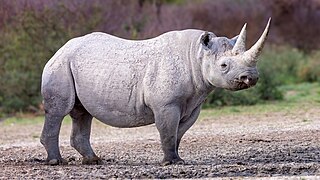
The black rhinoceros, black rhino or hook-lipped rhinoceros is a species of rhinoceros, native to eastern and southern Africa including Angola, Botswana, Kenya, Malawi, Mozambique, Namibia, South Africa, Eswatini, Tanzania, Zambia, and Zimbabwe. Although the species is referred to as black, its colours vary from brown to grey. It is the only extant species of the genus Diceros.

A rhinoceros, commonly abbreviated to rhino, is a member of any of the five extant species of odd-toed ungulates in the family Rhinocerotidae; it can also refer to a member of any of the extinct species of the superfamily Rhinocerotoidea. Two of the extant species are native to Africa, and three to South and Southeast Asia.
Zakouma National Park is a 3,000 km2 (1,158 sq mi) national park in southeastern Chad, straddling the border of Guéra Region and Salamat Region. Zakouma is the nation's oldest national park, declared a national park in 1963 by presidential decree, giving it the highest form of protection available under the nation's laws. It has been managed by the nonprofit conservation organization African Parks since 2010 in partnership with Chad's government.

Garamba National Park is a national park in the north-eastern Democratic Republic of the Congo covering nearly 5,200 km2 (2,000 sq mi). It is among Africa's oldest parks and was designated a World Heritage Site by UNESCO in 1980 for its protection of critical habitat for northern white rhinoceroses, African elephants, hippopotamuses, and giraffes. Garamba National Park has been managed by African Parks in partnership with the Institut Congolais pour la Conservation de la Nature since 2005.

The International Fund for Animal Welfare (IFAW) is one of the largest animal welfare and conservation charities in the world. The organization works to rescue individual animals, safeguard populations, preserve habitat, and advocate for greater protections. Brian Davies founded IFAW. IFAW was instrumental in ending the commercial seal hunt in Canada. In 1983 Europe banned all whitecoat harp seals products. This ban helped save over 1 million seals. IFAW operates in over 40 countries.

Environmental issues in Kenya include deforestation, soil erosion, desertification, water shortage and degraded water quality, flooding, poaching, and domestic and industrial pollution.

The western black rhinoceros or West African black rhinoceros is an extinct subspecies of the black rhinoceros. It was declared extinct by the IUCN in 2011. The western black rhinoceros was believed to have been genetically different from other rhino subspecies. It was once widespread in the savanna of sub-Saharan Africa, but its numbers declined due to poaching. The western black rhinoceros resided primarily in Cameroon, but surveys since 2006 have failed to locate any individuals.

The International Rhino Foundation (IRF) is a Texas-based charity focused on the conservation of the five species of rhinoceros which include the White Rhinoceros and Black Rhinoceros of Africa, and the Indian Rhinoceros, Javan Rhinoceros and Sumatran Rhinoceros of Asia.

The ivory trade is the commercial, often illegal trade in the ivory tusks of the hippopotamus, walrus, narwhal, black and white rhinos, mammoth, and most commonly, African and Asian elephants.
The African Wildlife Foundation (AWF) is an international conservation organization created with the aim of preserving Africa's wildlife, wild lands, and natural resources.
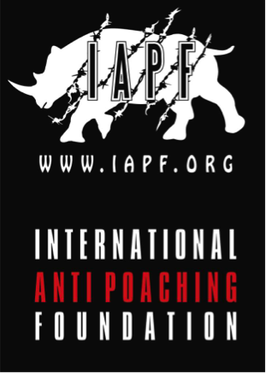
Akashinga, is a non-profit organisation registered in Australia, predominantly operating on the African continent. The group initially created a structured military-like approach to conservation, employing tactics and technology generally reserved for the modern-day battlefield, and has since moved to a community oriented approach. This has included the training of local women as rangers.
Jim Justus Nyamu, of Nairobi, Kenya, is an elephant research scientist and activist against poaching and trade in ivory. Nyamu is the executive director at the Elephant Neighbors Center (ENC) and is leader of the movement, Ivory Belongs to Elephants. He has also held positions at the African Conservation Centre and Kenya Wildlife Service. The ENC is a grass-roots collaborative and participatory research organization focused on enhancing the capacity of communities living with wildlife to promote interlinkages between species and their habitats.

TheBlack Mamba Anti-Poaching Unit is the world's first officially-formed, registered and recognised all-female wildlife ranger unit, founded in 2013, with the purpose of protecting wildlife in the regions of the Olifants West Nature Reserve, and the buffer zone in the Greater Kruger of South Africa. The Black Mamba APU was awarded the Champions of the Earth Award, in 2015, by the United Nations Environment Program (UNEP). In the period between 2013 and 2022, the Black Mamba APU has won 10 International awards, for innovative approach to wildlife conservation.

Many species are affected by poaching, including illegal hunting, fishing and capturing of wild animals, and, in a recent usage, the illegal harvesting of wild plant species. The article provides an overview of species currently endangered or impaired by poaching in the Americas, sub-Saharan Africa, and South-East Asia.
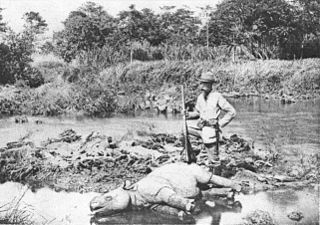
Rhinoceros poaching in southern Africa is the illegal act of slaughtering rhinoceros in the southern African countries of Namibia, Botswana, Zimbabwe and South Africa, where most of Africa's rhinos live. The most common reason for rhino poaching is to meet the high demand for their horns in Asian countries, where the horn is predominantly used in Traditional Chinese Medicine but is increasingly being used as a symbol of wealth and prosperity. In previous generations, the most common rhino poaching activity was hunting for recreational purposes. Because of excessive poaching, rhino populations have decline rapidly since the 1970s, leaving some species critically endangered and facing extinction.
Hemmersbach Rhino Force is a direct action conservation organization acting with a focus on the African rhinos. Rhino Force's main activities consist of anti-poaching rangers in the Greater Kruger National Park, a biobank called Hemmersbach Rhino Force Cryovault to preserve rhino genes and the Black Rhino Reintroduction to bring back rhinos to the Mid Zambezi Valley in Zimbabwe.
The Akashinga Rangers is an all-female anti-poaching group in Zimbabwe. The group is the subject of a 2020 documentary titled Akashinga: The Brave Ones.
How Many Elephants is an anti-poaching conservation charity based in the United Kingdom. The charity supports female and mixed ranger teams in Africa.
